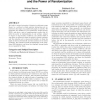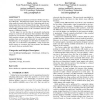29 search results - page 3 / 6 » sigecom 2006 |
SIGECOM
2006
ACM
13 years 10 months ago
2006
ACM
We study coalitional games where the value of cooperation among the agents are solely determined by the attributes the agents possess, with no assumption as to how these attribute...
SIGECOM
2006
ACM
13 years 10 months ago
2006
ACM
We study a natural extension of classical evolutionary game theory to a setting in which pairwise interactions are restricted to the edges of an undirected graph or network. We ge...
SIGECOM
2006
ACM
13 years 10 months ago
2006
ACM
Online reputation mechanisms need honest feedback to function effectively. Self interested agents report the truth only when explicit rewards offset the cost of reporting and th...
SIGECOM
2006
ACM
13 years 10 months ago
2006
ACM
Structured peer-to-peer systems allow to administer large volumes of data. Several peers collaborate to generate a query result. Analyses of unstructured peer-to-peer systems, nam...
SIGECOM
2006
ACM
13 years 10 months ago
2006
ACM
Braess’s Paradox is the counterintuitive but well-known fact that removing edges from a network with “selfish routing” can decrease the latency incurred by traffic in an eq...


